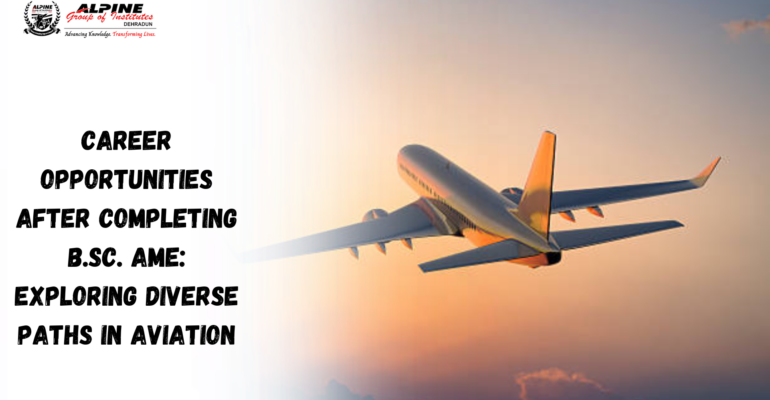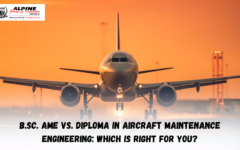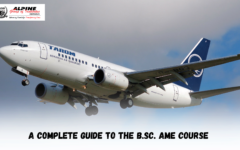Career Opportunities After Completing B.Sc. AME: Exploring Diverse Paths In Aviation
2024-12-27 6:23Career Opportunities After Completing B.Sc. AME: Exploring Diverse Paths In Aviation
The B.Sc. Aircraft Maintenance Engineering (AME) course offers an exciting and dynamic career trajectory for individuals passionate about aviation, technology, and hands-on problem-solving. As air travel continues to expand globally, the aviation industry is in constant need of skilled professionals to ensure that aircraft remain safe, efficient, and operational.
Upon completing the B.Sc. AME course, students are well-prepared to embark on a fulfilling career in various sectors of the aviation industry. Whether you’re interested in working with commercial airlines, military aviation, or aircraft manufacturers, the career opportunities for B.Sc. AME graduates are vast and diverse.
1. Aircraft Maintenance Engineer (AME)
One of the most prominent career options after completing a B.Sc. AME is working as an Aircraft Maintenance Engineer (AME).
Role and Responsibilities:
- Inspection and Repair: AMEs are responsible for inspecting aircraft, identifying mechanical issues, and carrying out necessary repairs to ensure safe operations.
- Troubleshooting: Diagnosing faults in aircraft systems (engines, avionics, hydraulics, etc.) and implementing fixes.
- Safety Checks: Performing routine maintenance checks and ensuring that the aircraft complies with all safety standards set by aviation authorities (like DGCA, FAA, or EASA).
- Certification: AMEs also play a role in certifying that aircraft are fit for flight and meet regulatory standards. This responsibility often requires obtaining specialized licenses.
Job Outlook:
Aircraft Maintenance Engineers are in high demand globally, and their job stability is typically strong due to the ongoing need for air travel and the complexity of modern aircraft. AMEs can work for commercial airlines, airports, military aviation, and aircraft maintenance organizations (MROs).
2. Aircraft Technician
After completing a B.Sc. AME, graduates can choose to become Aircraft Technicians. This role is often a stepping stone for individuals interested in hands-on maintenance and repair tasks.
Role and Responsibilities:
- Maintenance and Repairs: Aircraft Technicians are responsible for performing basic maintenance tasks, such as repairing or replacing aircraft components, engines, or systems.
- Routine Inspections: Technicians carry out scheduled checks on aircraft to ensure all systems are functioning properly, identifying issues before they become serious problems.
- Component Overhaul: They may be involved in the overhaul and testing of aircraft components, engines, and systems.
Job Outlook:
Aircraft Technicians are always in demand in airline fleets, MROs, and aircraft manufacturing companies. Technicians can gain experience and progress to higher-level roles like Aircraft Engineers or Supervisors.
3. Aviation Maintenance Manager
For those who are interested in leadership and management roles, becoming an Aviation Maintenance Manager is a natural progression after gaining experience as an Aircraft Technician or Engineer.
Role and Responsibilities:
- Supervising Teams: Aviation Maintenance Managers oversee teams of engineers, technicians, and support staff involved in aircraft maintenance and repair operations.
- Scheduling Maintenance: They ensure that aircraft maintenance schedules are followed, including regular inspections, repairs, and upgrades.
- Compliance and Safety: They ensure that maintenance operations adhere to aviation safety standards and regulatory requirements.
- Budget Management: Maintenance Managers are also responsible for managing budgets, procurement of parts, and ensuring that the maintenance processes are cost-efficient.
Job Outlook:
With growing air traffic and larger fleets, there is a constant need for skilled Aviation Maintenance Managers. These roles are typically found within airlines, maintenance organizations, and aviation companies.
4. Avionics Technician
Graduates of the B.Sc. AME course who specialize in electronics and avionics systems may pursue a career as an Avionics Technician.
Role and Responsibilities:
- Avionics Systems Repair: Avionics Technicians work with the electrical and electronic systems of the aircraft, including navigation systems, communication systems, flight control systems, and radar systems.
- Testing and Calibration: They ensure that avionics systems are correctly calibrated and functioning according to specifications.
- Troubleshooting: When avionics systems fail, technicians diagnose and fix the issues, often working with complex software and hardware.
Job Outlook:
With the increasing complexity of aircraft electronics, the demand for Avionics Technicians is on the rise. Opportunities exist in airlines, aircraft manufacturers, and aviation maintenance organizations.
5. Aircraft Inspector
For those who are detail-oriented and have a keen eye for safety and compliance, becoming an Aircraft Inspector can be an excellent career choice.
Role and Responsibilities:
- Routine Inspections: Aircraft Inspectors perform detailed checks on aircraft systems, components, and structures to ensure they meet the necessary safety standards.
- Pre-Flight and Post-Flight Inspections: They carry out pre-flight checks before the aircraft takes off and post-flight inspections to ensure the aircraft is fit for future flights.
- Compliance Certification: They ensure that aircraft comply with aviation regulations and certify the airworthiness of the aircraft.
Job Outlook:
Aircraft Inspectors are always in demand within the aviation industry, especially in airlines, aircraft manufacturing companies, and MROs. This role offers good career stability due to its importance in ensuring air travel safety.
6. Aviation Consultant
Graduates with a B.Sc. AME may also consider becoming an Aviation Consultant, especially if they have strong problem-solving and communication skills.
Role and Responsibilities:
- Providing Expertise: Aviation Consultants offer expert advice to aviation companies regarding aircraft maintenance, regulatory compliance, operational efficiency, and safety standards.
- Improving Operations: They work with airlines, airports, and other aviation-related businesses to streamline operations and improve safety practices.
- Training and Workshops: Consultants may also design and deliver training programs for aviation professionals on the latest maintenance procedures, safety practices, and regulations.
Job Outlook:
Aviation Consulting is a highly specialized field, often offering opportunities to work with major aviation corporations, airlines, or government agencies. Consultants typically enjoy high salaries and flexibility in their roles.
7. Aircraft Manufacturing Engineer
For those interested in the design and development side of aviation, becoming an Aircraft Manufacturing Engineer is an excellent career option.
Role and Responsibilities:
- Design and Development: Manufacturing Engineers are involved in the design and production of new aircraft, ensuring that they meet safety and performance standards.
- Material Selection: They work with materials scientists to select the appropriate materials for various parts of the aircraft.
- Testing and Quality Assurance: Engineers are involved in testing aircraft components to ensure that they meet all safety and regulatory standards.
Job Outlook:
With the continued innovation in aircraft design, Manufacturing Engineers are in demand, especially with major aircraft manufacturers like Boeing, Airbus, and smaller aircraft companies.
8. Technical Trainer in Aviation
For graduates who enjoy teaching and sharing knowledge, a career as a Technical Trainer in the aviation sector may be fulfilling.
Role and Responsibilities:
- Training Technicians and Engineers: Trainers teach future aircraft technicians and engineers about the latest technologies, maintenance practices, and safety standards.
- Curriculum Development: Trainers develop training programs to keep aviation professionals updated with the latest regulatory changes and technological advancements.
- Certifications: They also prepare professionals for certification exams and licensing by aviation authorities.
Job Outlook:
With the rapid advancement of technology in aviation, there is a growing need for skilled trainers. Aviation schools, universities, and training institutes often seek experienced professionals to teach the next generation of aviation engineers.
Conclusion
Completing a B.Sc. AME opens up a multitude of career opportunities in the aviation industry. Whether you are interested in becoming an Aircraft Maintenance Engineer, Avionics Technician, Aviation Consultant, or pursuing managerial roles like Maintenance Manager, the aviation sector offers diverse and lucrative career paths.
The global demand for skilled aviation professionals ensures that there is ample job security, growth potential, and the opportunity to work in exciting, high-tech environments. Additionally, the satisfaction of contributing to the safety and efficiency of air travel adds to the rewarding nature of these careers.
So, whether you’re drawn to technical work, management, or consultancy, the B.Sc. AME course provides the foundation for a successful career in aviation, with opportunities to grow, specialize, and explore various roles in this ever-evolving industry.






